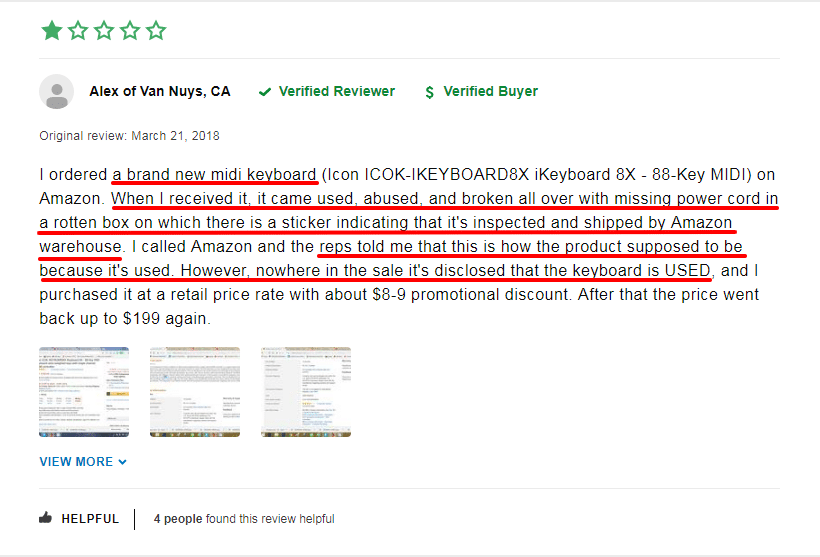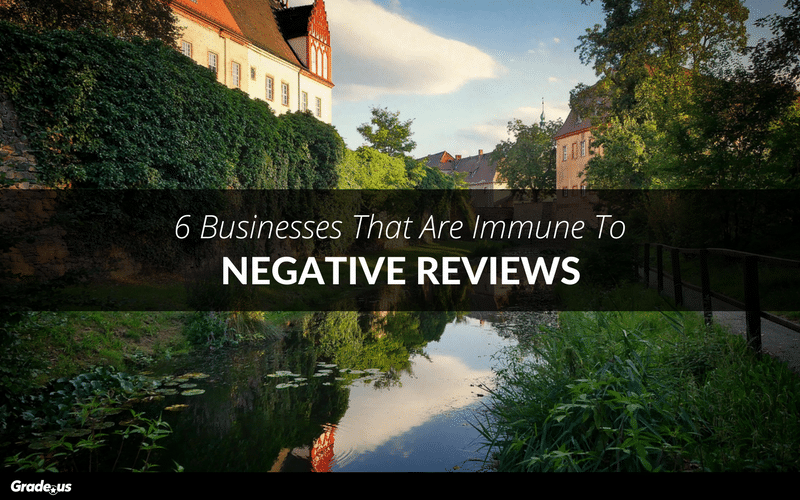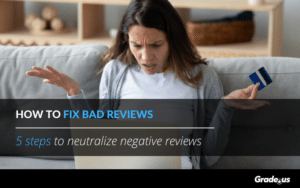Look at this horrible review.
"I ordered a brand new midi keyboard... When I received it, it came used, abused, and broken all over with missing power cord in a rotten box..."
If you're like many shoppers, you read a negative review like this and an unpleasant picture comes to mind. A sketchy looking ecommerce store you've never heard of with no reviews or contact info. The kind of site most shoppers have been burned by in the past.
Here's the problem.
This review didn't come from a sketchy looking ecommerce store you've never heard of.
An angry customer wrote this negative review about...
Amazon.
That's right, Amazon.com. This isn't a disgruntled customer reviewing a product on Amazon. Oh no, they're writing an negative review about Amazon, on ConsumerAffairs.com.
Take a look.

Amazon has a 2 1/2 star rating and thousands of negative reviews at ConsumerAffairs.com which, to be honest, is pretty bad. But I'm willing to bet that you're probably unaware of that fact.
It's true.
There are negative reviews, forum posts by customers complaining about their awful service. Hate pages and groups where customers admit "Amazon kind of sucks and we've all just come to accept it."
Yikes.
Does this mean Amazon is a terrible company? That they don't care about their customers?
Absolutely not.
They're doing a lot of things right. Overall, it seems they're doing their best to get things right. But Amazon, for the most part, seems to be immune to negative reviews. When the backlash is severe enough, i.e. significant press coverage, they'll listen.
Which businesses are immune to negative reviews?
Big businesses.
That would be my first guess too. The kind of businesses that are simply too big to fail. That's the assumption anyway.
But, is that true?
Not as much as you'd think. While size plays a role, it's not the determining factor. There's actually something else, something that's easy-to-ignore and discounted by most marketers because it's not really on our radar.
Moats.
I'm not talking about the very large and very deep ditch that's filled with water and surrounds a medieval castle. No, I'm talking about an economic moat.
The term "economic moat" was coined by Warren Buffett, legendary investor and executive at Berkshire Hathaway. An economic moat is the competitive advantage one company has over their competitors. An economic moat accomplishes two things (1.) it enables a company to dominate the marketplace and (2.) it keeps competitors at bay - often indefinitely.
What does that look like?
1. Brand moat. BMW represents a particular set of values and ideals. They've used authority, prestige, consistency and regular advertising to condition the public. Customers who want a BMW are eager to pay the premium price they ask.
2. Secret moat. Google's search algorithm is a trade secret. With it, they're able to give us incredibly accurate search results. Something their competitors can't seem to duplicate.
3. Toll moat. Your utility (water, electricity, heat) and internet service providers are typically the only games in town. For a long time your choices were simple. Work with them or go without.
4. Switching moat. Amazon's dominance is simple. They've used programs and products like Amazon Prime, Kindle and Amazon Web Services to embed themselves in our lives. Switching would be incredibly painful and difficult for most of us.
5. Price moat. Walmart uses their strategy, purchasing and infrastructure to guarantee low prices. They're typically able to sell products at a price that's lower than their competitor's breakeven cost.
6. Access moat. Facebook isn't what you'd call a beloved company. Their users hate them. They're listed as one of America's most hated companies. But, there's one thing that keeps their users coming back. Everyone you know is already on Facebook.
These six businesses are immune to negative reviews.
See the problem?
These moats are indicators. They communicate the fact that you're able to give customers something they can't / won't get anywhere else. When it's done right it's incredibly appealing.
Which is part of the problem.
In the beginning, companies are well behaved. They're doing everything they can to establish their moat. They're attentive to customer reviews, focused on providing exceptional customer service.
If your business is exceptional it won't stay that way...
Not by default that is.
It requires a significant amount of time, effort and energy to maintain that kind of discipline and focus. It's a difficult task for most businesses to achieve let alone maintain.
Which is where the negative reviews come in.
In the beginning it's easy to build your moat. You give customers something they can't or won't get anywhere else. They reward you with their loyalty - eagerly or begrudgingly.
There's an unspoken expectation customers have from businesses in general.
Keep it great, make it better.
Maintain and grow, hold and carry. You created an amazing innovation last year? You'll have to maintain the incredibly high standard you've set and come up with something amazing next year. It's the never-ending cycle of innovation and growth.
Customers expect to be wowed.
There's this unspoken assumption that your world revolves around theirs. They're the customer, you're there to serve them. That's the way this arrangement works.
What happens when you fail?
Customers become disgruntled, resentful and unhappy. The negative reviews begin to trickle in, growing rapidly if they're ignored. If you're running a business with a strong economic moat you're essentially immune to negative reviews.
You can avoid negative reviews indefinitely.
Or not.
As it turns out, immunity to negative reviews is temporary
An economic moat needs context and circumstance to work. Take that away and your business is no longer immune to negative reviews.
Skeptical?
Let's look at a notable example.
Comcast.
Comcast relied on their toll moat. Internet service providers had location specific monopolies for several years, back then your choice was simple. Work with Comcast or go without. This also meant there really wasn't a compelling reason for them to be nice to their customers.
So they weren't. Instead they...
1. Incorrectly billed their customer $1,775. They refused to issue a refund, telling him to take it up with his bank.
2. Overcharged a customer, then lied on him and got him fired.
3. Refused to cancel a customer's account, choosing instead to harass and fight with him for 10 minutes.
Another customer had to fight Comcast for 9 months, for the right to cancel his service.
4. Were listed as America's most hated company in 2014, 2015, 2016 and 2017.
5. Bullied tens of thousands of customers, prompting them to post negative reviews filled with horrifying, nightmarish stories of their own. They've mostly been ignored.
6. Comcast customer service reps have changed the names on customer accounts to things like super b**ch and a**hole brown.
7. Told a customer only her dead husband could cancel their service.
Customer's knew why they were being mistreated.

Comcast had a moat. The toll moat that essentially guaranteed they were they only option customers could go to. This would have been wonderful if Comcast decided to treat their customers well.
They decided against that.
Their moat continued to hold, until their competitors, AT&T U-Verse and Verizon FiOS, destroyed their moat. The negative reviews continued to pour in, only this time customers had more options.
Comcast has struggled ever since.
They negotiated a partnership with Amazon. Amazon opened a store to sell cable service. They were pounded by negative reviews. Customers used phrases like "overpriced garbage monopoly" to convey their disinterest.
Amazon gave up after just one year. The reviews were that bad.
Comcast tried rebranding their company to Xfinity. Customers, analysts and investors laughed. They were widely mocked and universally condemned for their rebrand. Comcast wants to change their reputation now, because they have to.
They no longer have a moat.
But it's too late. Customers don't care. The damage has been done. They're a massive company but they're no longer immune to negative reviews.
Businesses immune to negative reviews? That's a myth
A strong economic moat buys you time.
Don't have an economic moat? You don't have the luxury of ignoring negative reviews. Customers today are sophisticated and discerning. Be helpful, be great or be gone.
There's no other option.
Economic moats or not, you need negative reviews. They're error correction mechanisms, the canary in the coalmine. They're wonderful gifts, customers who are willing to tell you the truth - brutally, kindly, openly - it makes no difference.
Your business is exceptional. It will stay that way...
If you accept your negative reviews. These unpleasant reviews are the survival tools your business desperately needs. Do negative reviews mean you don't care about your customers? That you're running a terrible business?
Absolutely not.
It means you have an opportunity to listen, to learn and to grow. Look at your horrible reviews, lean into them. Treat them as the gifts they are and you'll find immunity stops mattering.
About the Author
Andrew McDermott
Andrew McDermott is the co-founder of HooktoWin. He shows entrepreneurs how to attract and win new customers.










